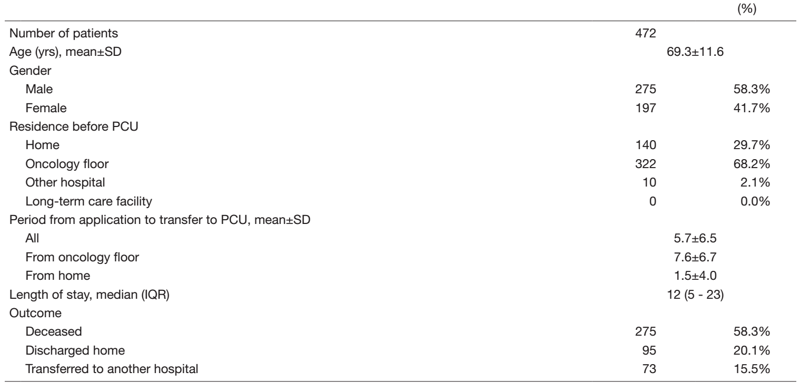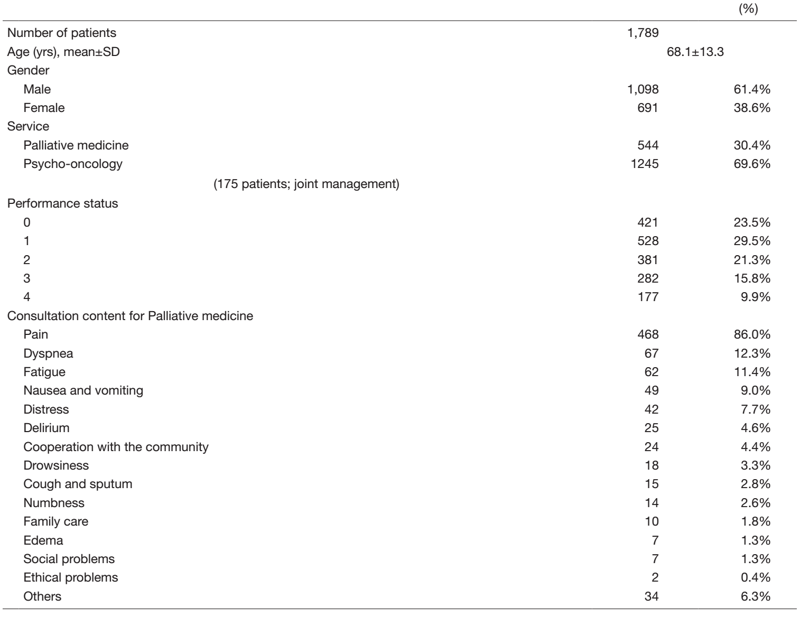Annual Report 2021
Department of Palliative Medicine
Yoshihisa Matsumoto, Tomofumi Miura, Kazuhiro Kosugi, Emi Kubo, Midori Yuki Yajima, Junji Yamaguchi, Yasutaka Shimotsuura, Kazue Umetsu, Saeko Sonokawa, Yuko Uehara, Yukako Hattori, Rie Yamamoto, Masako Ikeda, Sachiko Nagatsuma, Rumiko Osawa
Introduction
The purpose of our department is to improve the quality of life of cancer patients and their family caregivers by managing the irritable symptom burden and establishing a regional palliative care system. For that purpose, we provide 3 palliative care services: (1) outpatient clinic, (2) palliative care unit, and (3) supportive care team.
Additionally, the National Cancer Center Hospital East was certified as an ESMO designated center of integrated oncology and palliative care in 2018.
The Team and What We Do
1. Outpatient clinic
Patients with or without anti-cancer therapy consult our outpatient clinic about management of their symptoms or support to decide where and how to spend their lives (Table 1).
Table 1. Number of patients in outpatients clinic 

2. Palliative care unit
Our palliative care unit is the Japanese version of an acute palliative care unit (APCU). The features of APCUs are multidimensional assessment, rapid symptom control, and intensive psychosocial care with a shorter length of stay and lower death rate than in a traditional PCU. Medical social workers greatly contribute to the transition to palliative home care and transfers to other hospitals (Table 2).
Table 2. Number of patients in the PCU

3. Supportive care team
This team consists of physicians, psycho-oncologists, nurses, pharmacists, dieticians physiotherapists, and speech-language-hearing therapists. In the oncology section, our supportive care team takes a multidisciplinary approach for inpatients with various illnesses (Table 3).
Table 3. Number of patients treated by supportive care team

Research activities
1) Development of a support system for cancer patients at home using AI-based monitoring.
2) Research on the establishment of a support system for cancer patients with minor children using an online peer support system.
3) Research on the efficacy of specialized rehabilitation for cancer patients hospitalized in palliative care units.
4) Participation in multicenter observational studies, interventional studies, and surveys of bereaved families.
Clinical trials
1) A double-blind randomized controlled trial to relief the distress from chemotherapy-induced peripheral neuropathy using magnetic fields.
Education
The purpose is to promote our residents’ understanding of palliative care for cancer patients and their families. Residents can train in home palliative care on request. To disseminate knowledge about primary palliative care, we held several lectures for medical staff in NCCHE. Due to the COVID-19 pandemic, we did not hold the workshop which we had planned for regional palliative care staff.
Future Prospects
Our department will continue the above activities and develop new treatments and medical instruments to improve the QOL of cancer patients and their family caregivers.
List of papers published in 2021
Journal
1. Matsuda Y, Yamaguchi T, Matsumoto Y, Ishiki H, Usui Y, Kako J, Suzuki K, Matsunuma R, Mori M, Watanabe H, Zenda S. Research policy in supportive care and palliative care for cancer dyspnea. Japanese journal of clinical oncology, 52:260-265, 2022
2. Usui Y, Miura T, Kawaguchi T, Kosugi K, Uehara Y, Kato M, Kosugi T, Sone M, Nakamura N, Mizushima A, Miyashita M, Morita T, Yamaguchi T, Matsumoto Y, Satomi E. Palliative care physicians' recognition of patients after immune checkpoint inhibitors and immune-related adverse events. Supportive care in cancer: official journal of the Multinational Association of Supportive Care in Cancer, 30:775-784, 2022
3. Miura T, Elgersma R, Okizaki A, Inoue MK, Amano K, Mori M, Chitose H, Matsumoto Y, Jager-Wittenaar H, Ottery FD . A Japanese translation, cultural adaptation, and linguistic and content validity confirmation of the Scored Patient-Generated Subjective Global Assessment. Supportive care in cancer: official journal of the Multinational Association of Supportive Care in Cancer, 29:7329-7338, 2021
4. Mori M, Kawaguchi T, Imai K, Yokomichi N, Yamaguchi T, Suzuki K, Matsunuma R, Watanabe H, Maeda I, Uehara Y, Morita T. How Successful Is Parenteral Oxycodone for Relieving Terminal Cancer Dyspnea Compared With Morphine? A Multicenter Prospective Observational Study. Journal of pain and symptom management, 62:336-345, 2021
5. Suzuki K, Ikari T, Matsunuma R, Matsuda Y, Matsumoto Y, Miwa S, Mori M, Yamaguchi T, Watanabe H, Tanaka K. The Possibility of Conducting a Clinical Trial on Palliative Care: A Survey of Whether a Clinical Study on Cancer Dyspnea Is Acceptable to Cancer Patients and Their Relatives. Journal of pain and symptom management, 62:1262-1272, 2021
6. Maeda I, Satomi E, Kiuchi D, Nishijima K, Matsuda Y, Tokoro A, Tagami K, Matsumoto Y, Naito A, Morita T, Iwase S, Otani H, Odagiri T, Watanabe H, Mori M, Matsuda Y, Nagaoka H, Mayuzumi M, Kanai Y, Sakamoto N, Ariyoshi K. Patient-perceived symptomatic benefits of olanzapine treatment for nausea and vomiting in patients with advanced cancer who received palliative care through consultation teams: a multicenter prospective observational study. Supportive care in cancer: official journal of the Multinational Association of Supportive Care in Cancer, 29:5831-5838, 2021
7. Kosugi K, Nishiguchi Y, Miura T, Fujisawa D, Kawaguchi T, Izumi K, Takehana J, Uehara Y, Usui Y, Terada T, Inoue Y, Natsume M, Yajima MY, Watanabe YS, Okizaki A, Matsushima E, Matsumoto Y. Association Between Loneliness and the Frequency of Using Online Peer Support Groups Among Cancer Patients With Minor Children: A Cross-Sectional Web-Based Study. Journal of pain and symptom management, 61:955-962, 2021
